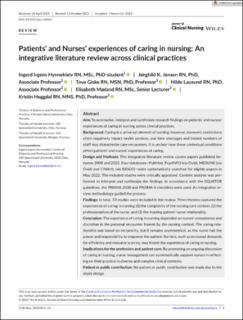| dc.contributor.author | Hynnekleiv, Ingerd Irgens | |
| dc.contributor.author | Jensen, Jørghild Karlotte | |
| dc.contributor.author | Giske, Tove | |
| dc.contributor.author | Lausund, Hilde | |
| dc.contributor.author | Mæland, Elisabeth | |
| dc.contributor.author | Heggdal, Kristin | |
| dc.date.accessioned | 2024-01-02T08:59:11Z | |
| dc.date.available | 2024-01-02T08:59:11Z | |
| dc.date.created | 2023-12-14T11:19:23Z | |
| dc.date.issued | 2023 | |
| dc.identifier.citation | Journal of Clinical Nursing (JCN). 2023, 1-23 | en_US |
| dc.identifier.issn | 0962-1067 | |
| dc.identifier.uri | https://hdl.handle.net/11250/3109249 | |
| dc.description.abstract | Aim: To summarise, interpret and synthesize research findings on patients' and nurses' experiences of caring in nursing across clinical practices.
Background: Caring is a universal element of nursing; however, economic restrictions often negatively impact health services, and time shortages and limited numbers of staff may characterize care encounters. It is unclear how these contextual conditions affect patients' and nurses' experiences of caring.
Design and Methods: This integrative literature review covers papers published between 2000 and 2022. Four databases—PubMed, PsycINFO (via Ovid), MEDLINE (via Ovid) and CINAHL (via EBSCO)—were systematically searched for eligible papers in May 2022. The included studies were critically appraised. Content analysis was performed to interpret and synthesize the findings. In accordance with the EQUATOR guidelines, the PRISMA 2020 and PRISMA-S checklists were used. An Integrative review methodology guided the process.
Findings: In total, 33 studies were included in the review. Three themes captured the experiences of caring in nursing: (1) the complexity of the nursing care context, (2) the professionalism of the nurse, and (3) the trusting patient–nurse relationship.
Conclusion: The experience of caring in nursing depended on nurses' competence and discretion in the personal encounter framed by the nursing context. The caring relationship was based on reciprocity, but it remains asymmetrical, as the nurse had the power and responsibility to empower the patient. Barriers, such as increased demands for efficiency and resource scarcity, may hinder the experience of caring in nursing.
Implications for the profession and patient care: By promoting an ongoing discussion of caring in nursing, nurse management can systematically support nurses in reflecting on their practice in diverse and complex clinical contexts.
Patient or public contribution: No patient or public contribution was made due to the study design | en_US |
| dc.language.iso | eng | en_US |
| dc.publisher | John Wiley & Sons | en_US |
| dc.rights | Attribution-NonCommercial-NoDerivatives 4.0 Internasjonal | * |
| dc.rights.uri | http://creativecommons.org/licenses/by-nc-nd/4.0/deed.no | * |
| dc.subject | person-centered care | en_US |
| dc.subject | perceived care | en_US |
| dc.subject | patient–nurse relationship | en_US |
| dc.subject | patient perspective | en_US |
| dc.subject | nursing | en_US |
| dc.subject | integrative review | en_US |
| dc.subject | experience of caring | en_US |
| dc.subject | caring | en_US |
| dc.title | Patients' and nurses' experiences of caring in nursing: An integrative literature review across clinical practices | en_US |
| dc.type | Peer reviewed | en_US |
| dc.type | Journal article | en_US |
| dc.description.version | publishedVersion | en_US |
| dc.rights.holder | © 2023 The Authors. Journal of Clinical Nursing published by John Wiley & Sons Ltd. | en_US |
| dc.source.pagenumber | 1-23 | en_US |
| dc.source.journal | Journal of Clinical Nursing (JCN) | en_US |
| dc.identifier.doi | 10.1111/jocn.16964 | |
| dc.identifier.cristin | 2213540 | |
| cristin.ispublished | true | |
| cristin.fulltext | original | |
| cristin.qualitycode | 2 | |

